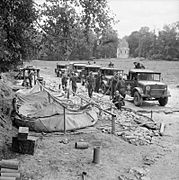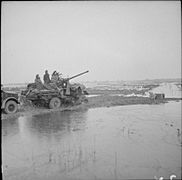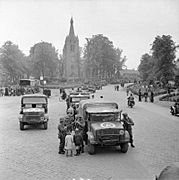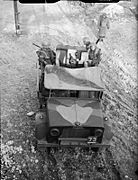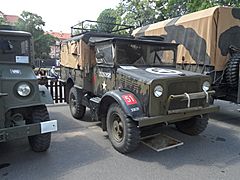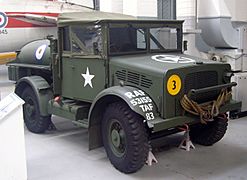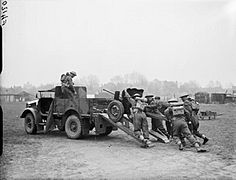Bedford MW facts for kids
Quick facts for kids Bedford MW |
|
|---|---|
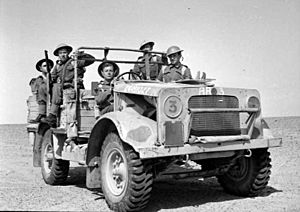
Bedford MWD 15cwt truck with Rhodesian troops of the 60th King's Royal Rifles, Western Desert, 1942.
|
|
| Type | General service truck |
| Place of origin | United Kingdom |
| Service history | |
| In service | 1939–late 1950s |
| Used by | British Army, Royal Air Force & Royal Navy |
| Wars | Second World War |
| Production history | |
| Designer | Bedford Vehicles |
| Designed | 1937 |
| Manufacturer | Bedford Vehicles |
| No. built | More than 66,000 |
| Specifications | |
| Mass | 2.1 long tons (2.1 t) |
| Length | 14 ft 4 in (4.37 m) |
| Width | 6 ft 6 in (1.98 m) |
| Height | 7 ft 6 in (2.29 m) |
| Crew | 2 |
|
|
|
| Engine | Six-cylinder inline Bedford OHV 210 cu in (3.5 L) petrol 72 bhp (54 kW) at 3,000rpm |
| Payload capacity | 15 long cwt (760 kg) |
| Drive | Wheeled 4x2 |
| Transmission | 4 forward, 1 reverse |
| Suspension | Live axles on semi-elliptical multi leaf springs |
| Maximum speed | 40 mph (64 km/h) |
| References | Chris Bishop & Pat Ware |
The Bedford MW was a special kind of truck used by the British military during the Second World War. It was a very important vehicle for moving supplies and soldiers.
Contents
How the Bedford MW Was Made
The Bedford MW was a truck that could carry about 760 kilograms (15 cwt) of weight. It had two-wheel drive, meaning power went to two of its wheels. This made it great for roads, but not so much for really rough ground.
It had a powerful engine with six cylinders that ran on petrol. This engine gave the truck good speed and made it easy to drive. Even though it wasn't made for off-road adventures, its strong engine and light weight made it quick.
Early versions of the MW had an open cab, which means the driver was exposed to the weather. It had a windscreen that could fold down and a canvas roof that could be put up or taken down. Later, from 1943, they added an enclosed cab with doors and plastic side windows. The canvas roof stayed the same. The truck also had a wide front part, called a bonnet, which was designed for a special air filter.
History of the Bedford MW
In 1935, the British military needed a new small truck. They asked different companies to show their designs. Bedford Vehicles entered the competition with a modified version of one of their existing trucks.
After some tests, Bedford made changes like adding a bigger radiator and larger tyres. More tests happened in 1936. For the 1937 tests, Bedford built a special prototype truck called the Bedford WD-1. This truck was designed to carry 15 cwt. It performed very well. In 1938, the powerful 72 horsepower engine was added.
Between 1939 and 1945, Bedford built over 66,000 MW trucks. These trucks were used by the British military until the late 1950s, showing how useful and reliable they were.
What the Bedford MW Was Used For
The MW truck was mainly meant to be a workhorse for the British Army's infantry battalions. Infantry battalions are groups of soldiers who fight on foot.
But during the war, the MW was used for many different jobs. It was also used by the Royal Air Force (RAF) and the Royal Navy. Other government departments and even some other countries used it too.
Different Types of Bedford MW Trucks
The Bedford MW was made into several different types, each for a specific job:
- Bedford MWD: This was the main cargo truck. It had a general service body and was used to transport supplies for infantry battalions.
- Bedford MWC: This version was a water tank truck, used to carry water for soldiers.
- Bedford MWT: This truck was a tractor for anti-aircraft guns, helping to move them around.
- Bedford MWG: This type was used to carry anti-tank guns like the Ordnance QF 2-pounder or 20mm Oerlikon guns.
- Bedford MWR: This was a radio truck, equipped with communication equipment.
- Bedford MWV: This version was a signals van for the Royal Air Force, used for sending and receiving messages.
Gallery
-
Bedford MWD trucks in Valkenswaard, the Netherlands
-
1st Royal Irish Fusiliers with French 25mm 34 SA anti-tank gun on the back of a Bedford MWD, January 1940.
 | Bayard Rustin |
 | Jeannette Carter |
 | Jeremiah A. Brown |


